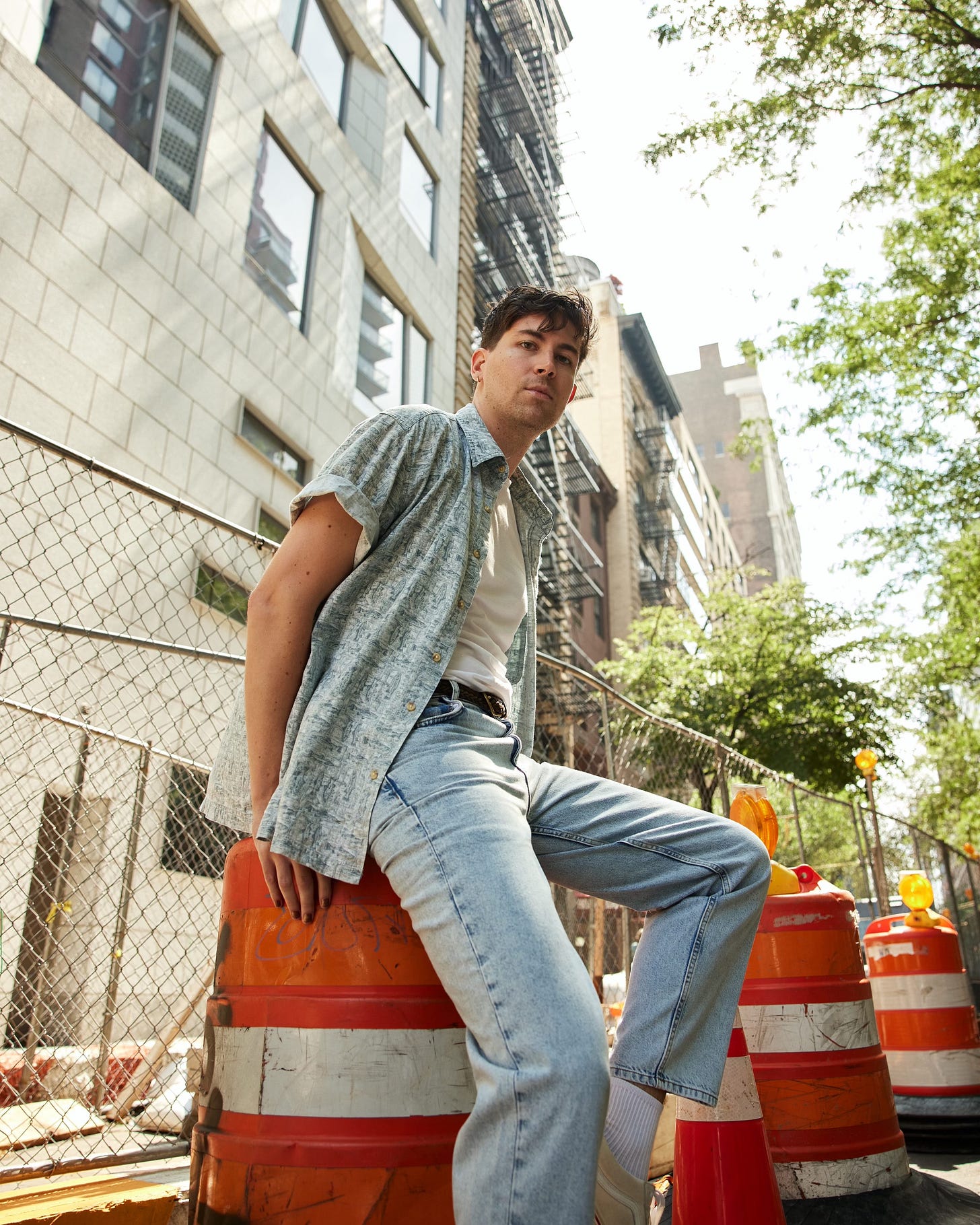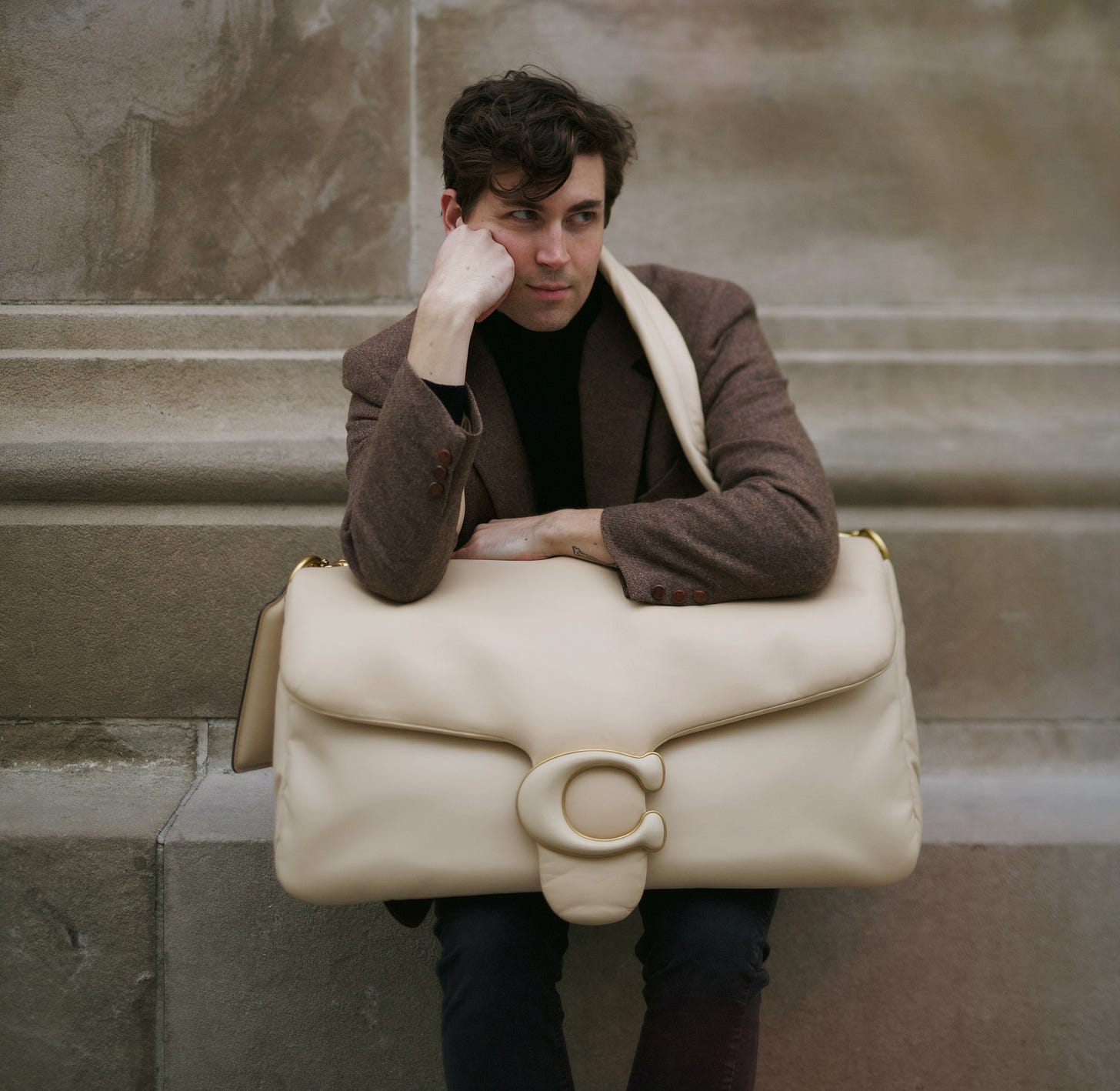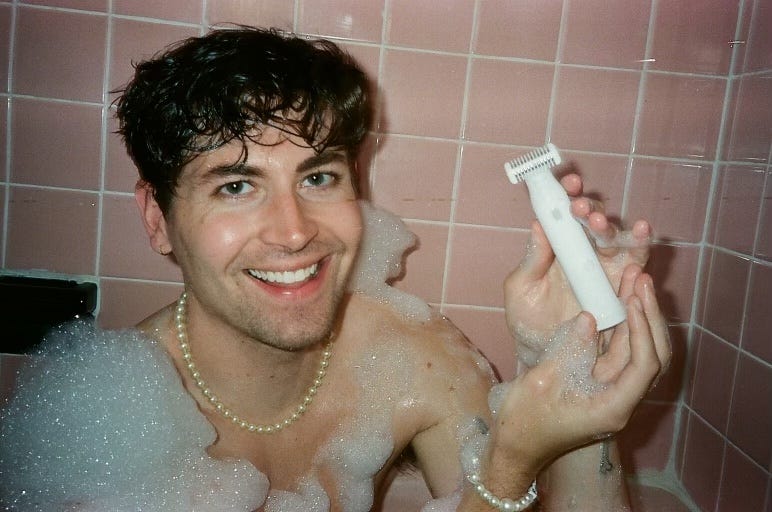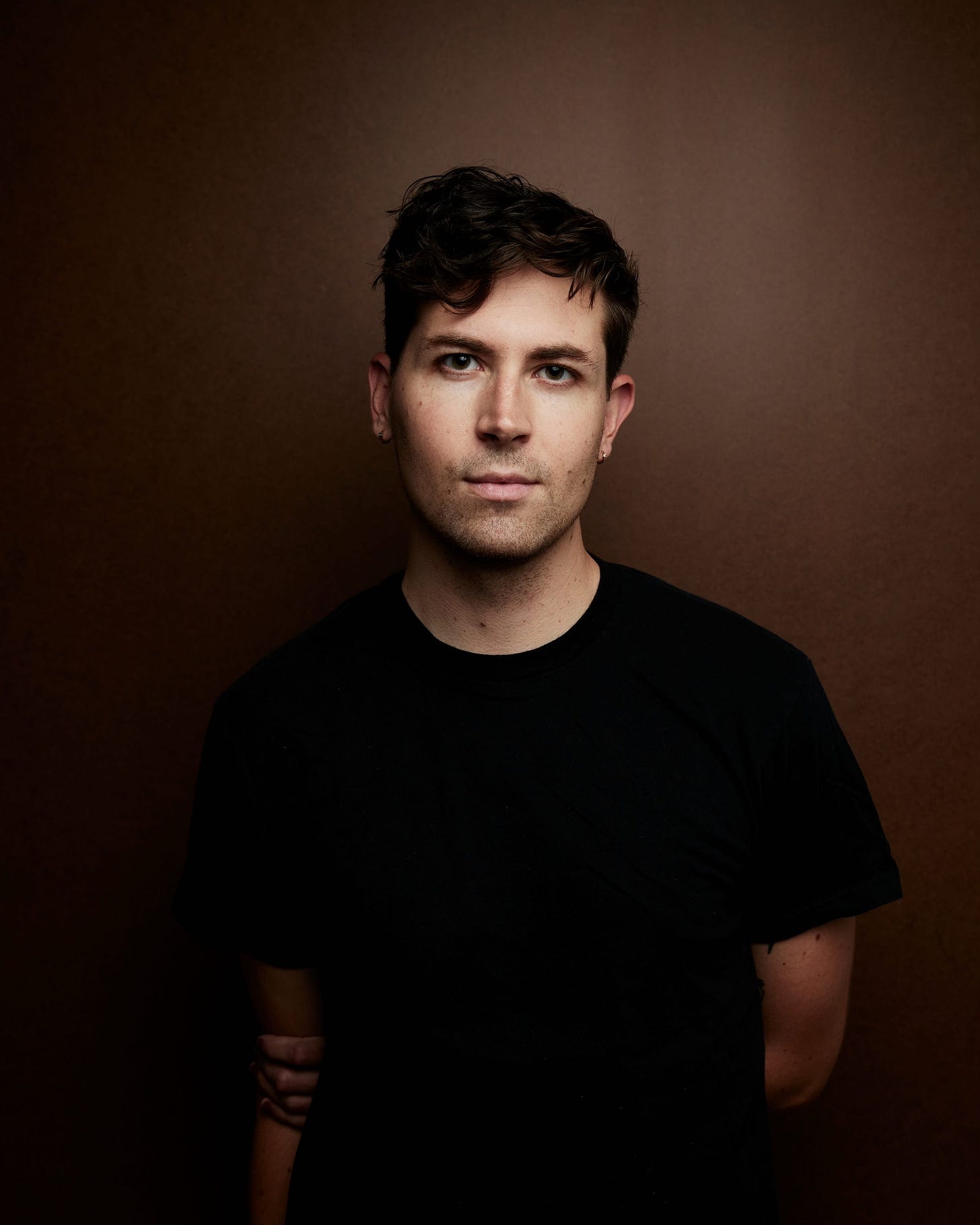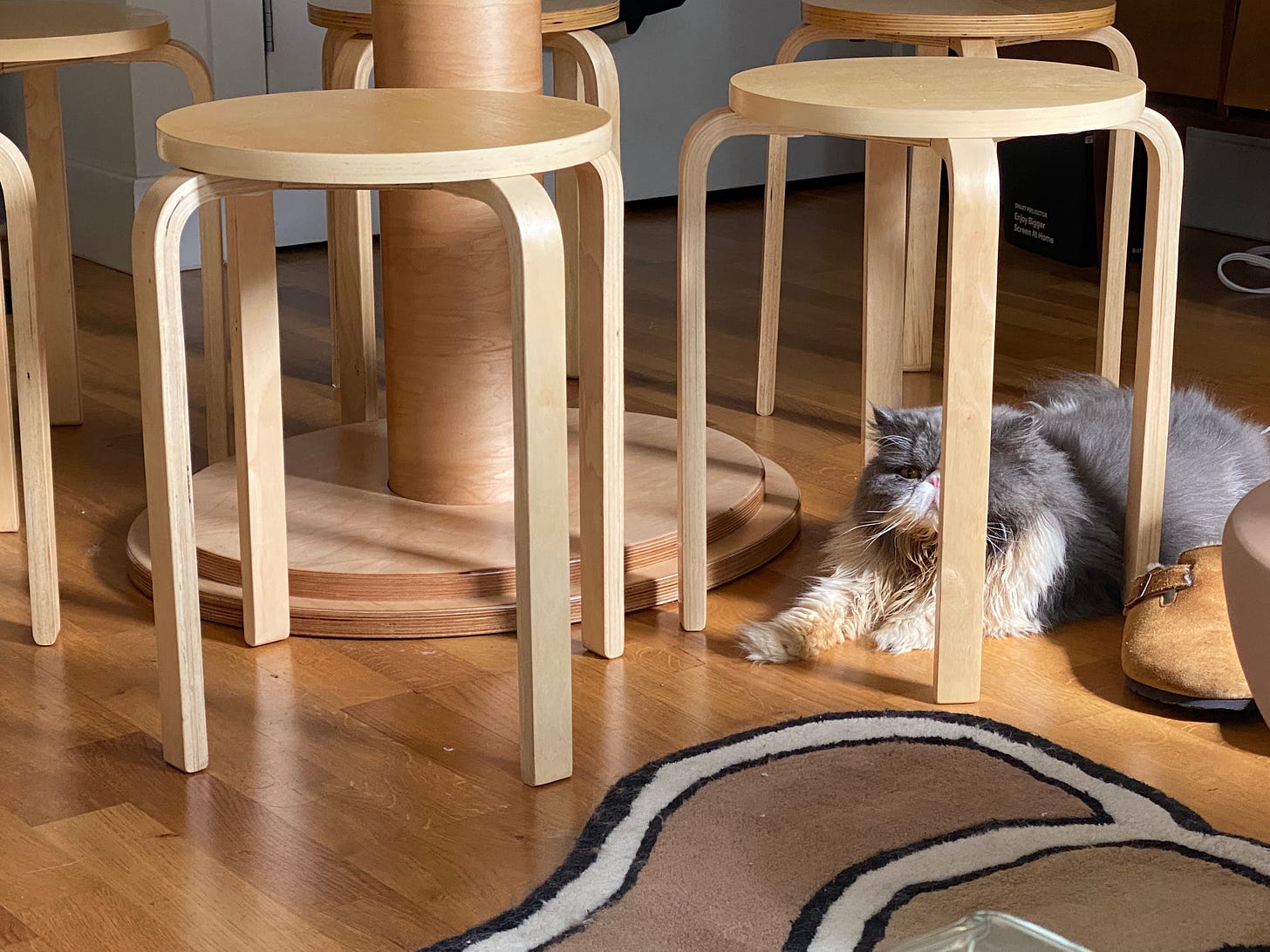#75: Are you verified?
Maybe Baby is a free Sunday newsletter. If you love it, consider supporting it financially. For $5/mo, you’ll gain access to my weekly recommendations, my monthly Q&A column, & my weekly podcast. Maybe Baby is reader-supported, hence the lack of ads and sponsors. Thank you!
Good morning!
This week I’m running a piece I wrote last year that never got published. It’s a profile of influencer Harry Hill, and it was commissioned by a magazine in April 2020 as part of a light-hearted series on comedians. By the time we finished working on it, things were really nosediving and the cultural mood was pretty bleak, so the editor and I agreed it wasn’t the right time to run it. And then months passed and things remained bleak, and then the piece started to feel a bit anachronistic and the right time never seemed to come. So I’ve decided to run it here, a year-and-a-half later, as a little hat-tip to whoever I was when I wrote it, and of course to Harry Hill, who lent me his time in the process of making it and never got to see it in lights.
I invited Harry on the podcast this week to check in on everything we talked about in our original interview. (I think he’s a little more cynical now and has a few things to get off his chest.) We also discuss being an influencer in 2021 and all the strange things the job entails. That’s out Tuesday 9am! In the meantime, I hope you enjoy the profile. Thank you to Kat Gillespie for commissioning and editing it last year when I was newly freelance and tracing circles around my apartment. It may have been a little doomed, thematically, but I’m grateful for the time capsule.
The Verification of Harry Hill
Harry Hill is sitting in Kim Kardashian’s foyer. He’s wearing a magenta tie-dyed hoodie and pearl stud earrings, and he’s grown a sparse but tidy quarantine mustache. A single lock of highlighted hair falls across his forehead. His posture is a little Hollywood starlet and a little Bushwick dirtbag, and if any of it seems performative, that’s probably intentional. It feels right, for instance, that the Kanye West-designed corridor behind him is just a virtual Zoom background; that it’s actually concealing his parents’ basement in suburban Chicago. The digital artifice suits him.
I learned about @veryharryhill, as he’s known on Instagram, last summer through a mutual friend. At the time, his feed was flooded with photos of him dunked in various hotel pools: reclining on a pink donut floatie in the Sahara Las Vegas, sipping a Macadamia nut piña colada in the Four Seasons Palm Springs, eating poolside chips and guac in the Mondrian Los Angeles. It was hard to tell if his captions about not working were sarcastic—if he was actually bragging about his life or merely pretending to be, as a bit: “Give this a #HateLike, especially if you’re hiding from your boss in the bathroom right now!” one read, posted on a Monday afternoon. “I can’t relate because as a #HotelsPoolHop, the pool is my boss.” Soon I realized they were all tagged #partner, and that I was looking at a mosaic of sponsored content that was somehow both aspirational and also a huge joke. I’d never seen anything like it.
“Hotels.com was looking for someone to be a 'pool hop,’” Hill tells me. “They wanted to pay someone $10,000 dollars to travel around the country and go to six different pools.... Such an insane fucking job.” At the time he got the gig, he was working as a “fellow” on the culture team at Mashable (“a glorified term for a paid intern, basically”), and although he loved it, he quit as soon as he realized he could make a living being himself. Or at least this version of himself: meme-maker, clout-chaser, pop-culture commentator. At 51.6k followers, his reach may not be at what most would consider quit-your-job level, but his ability (and confidence) to do so speaks to the singularity of his content.
It takes more than a cursory scroll to understand Hill’s online presence, which at first might seem try-hard but over time emerges as more of a satirical longcon—a meta-commentary on an influencer culture he both reveres and finds absurd. His feed is a hodgepodge of well-lit selfies, memes about being extra, American Girl doll starterpacks, short stories about Barbie, celebrity thirst, and about-town photos that cement his status as a New York party boy partial to Balenciaga. The brand seems chaotic until you catch onto his voice—the almost Gossip Girl-like tone of his long captions, the shameless attention-seeking and superficiality, the faux-fancy dialect he invented (“do it” is “doette”; “worth it” is “worthette”; “swipe up” is “swipeuppe”)—and then it begins to resemble performance art.
Hill doesn’t mind being called an influencer (after all, “That’s what I am! And so was Shakespeare”), but his self-conception goes beyond occupation. "In college I used to describe myself as a philosopher,” he says, “and today I don’t think I would call myself a practicing philosopher..." He pauses, thoughtful, then declares: "I think I would finally call myself a personality.” If he’s self-conscious about the emptiness of the term, it doesn’t show.
It’s hard to tell when Hill is kidding. That’s one of the most common DMs he gets: people asking if he’s serious. He doesn’t always know how to answer. "Sometimes I play with irony too much,” he says, “where I just keep peeling the layers back like an ironic onion.” Does he actually love American Girl dolls? Yes. Does he really have a private jet? Unclear. Is he actually publishing a book called Eat, Pray, Influence? Doubtful. But Hill understands that on Instagram, participation requires performance—and that a separation between what’s happening on and off the app is critical to its success. Whether his account is authentic to his IRL self doesn’t really matter, because it’s authentic to who he is on Instagram, and today, that’s a form of reality, too.
Consider his collaboration with skincare brand Peter Thomas Roth. It’s a video spoof wherein he adapts the famous monologue from American Psycho to fit his own skincare routine, including the product he’s being paid to sell: “While I wait for my shower to warm up I reach for the @PeterThomasRothOfficial FIRMx peeling mask,” he says, in a Patrick Bateman-like voiceover. “I apply it slowly and correctly, as if it’s my job. And in a way, it is. Once that’s...WAIT what’s- oh...my god...is my skin… COMING OFF?? Oh wait. No. That’s just the peeling gel visibly exfoliating by lifting, rolling, and sweeping away impurities to reveal a newer-looking complexion.” It’s the kind of sketch you might see a comedian post to satirize modern advertising, except in this case it is an advertisement, and Hill’s being paid to make it.
This was all part of the plan. Hill’s had his eye on Instagram fame since 2016, when he was a senior in college and started a meme account called @louisvuittonbackpack. For the first few months he didn’t do much beyond “shitpost” here and there, but then one night—New Year’s Eve, actually, because he loves a fresh start—he committed to posting three or four original memes a day. By graduation he had 15,000 followers and a strong sense that things were going to work out. But he knew he’d have trouble monetizing if he didn’t start incorporating his likeness. "While I was making memes—the whole time, even from the beginning—I was like, I don't want people to know my watermark, I want people to know my FACE.”
He started peppering in photos of his high cheekbones and pointy nose, thick floppy hair and long limbs clothed in preppy streetwear—eventually changing his handle to @veryharryhill. It paid off. “I remember the first time I got recognized was on 5th Avenue. This girl walked by and she just gave me a high five and said, ‘I love your Instagram account.’” (He also remembers when he “got the K”—as in, the K that turns up in your follower count when you reach 10K—“I was on the F train platform and called my mom.") After graduation he was living in Bushwick and working at a drunk brunch spot in Manhattan, where he would drink at work, make memes under the bar, and occasionally run into fans. “I just felt like a total”—he pauses, flips his hands out in front of him in a move I soon recognize as the viral Tik Tok dance, then completes the sentence: “renegade.” All his pistons were firing, anything felt possible. His follower count climbed to 30K, 40K, 50K. Then came the Mashable job, the Hotels.com gig, and finally, a life supported entirely by his internet personality.
He’s always wanted to be famous. He relates to the Lana Del Rey line, “If I said I didn't plan for it to turn out this way I'd be lying.” As a gay kid trying to find himself, he loved reading trashy teen books about popular girls, and believes they informed his ambitions. “I always loved the popular girl—like, who is she? Why is she the way she is? What's her backstory?” Now he wants to be the popular girl, even if only as a joke. “There's a lot to explore in trying to give a voice to something you’re not.” In college he walked around campus like he was dodging paparazzi. “I really wanted random people to know who I am and be curious about my life."
Now, when he gets recognized at the grocery store, he thinks, this isn’t a fluke. He’s not the type to act surprised—to pretend like he never knew this could happen to him. “I've been putting my face online for years now,” he says. “This is what I wanted!" Even the extreme, alienating kind of fame doesn’t scare him. "I think it would be funny to be like, walking down the street in Soho and have someone be like, ‘TMZ TMZ TMZ how are you?' and I'd be like,”—here he affects a high, popular-girl voice—“‘I'm good just going to Nespresso to get a free latte byeeeeee.'"
Hill owns his thirst. This is part of his appeal, online and off. His approach to Instagram is shamelessly strategic, and hearing him talk about it further underscores why he’s so effective at what he does. He’s not afraid to delete a post if it doesn’t perform (especially if it’s something he worked really hard on and “needs to be a box office hit”), although he’ll leave it if the stakes are low (in which case he’ll “need to raise that kid and watch it grow”). He hates seeing a post he believes in suffer from lack of attention: “That's the hardest part, watching it thirst for water, like watching it”—he mimics a choking sound —“die in the desert of your feed." Twitter’s different: “If I don’t get engagement within a minute I just pull it from the shelf."
This is how Hill talks about the internet, full of theatrical metaphors and pseudo-corporate jargon. He’s arrestingly quick-witted, and just like his Instagram persona, has a passion for taking the unserious very seriously. When I ask if he’s verified on Instagram, for example, he responds by curling his hands into tight fists and releasing a cartoonish, guttural, “Nooooooo!!!” I’ve hit a sore spot. He’s tried every single thing to get a blue check, he says. “I’ve literally drafted essays called, ‘How the Fuck Do You Get Verified on Instagram?’” He applies on the app every morning like clockwork (“Some people enter the Broadway lottery every morning—I try to get verified”). He’s heard the rumors—like that your default photo has to show your face (done), or that you need to work in media or have press (done and done), but he’s pretty sure it’s all lore. That the only actual requirement is knowing the right people. With a network including Caroline Calloway, Lena Dunham, and Cat Marnell, you’d think he’d have it in the bag, but Instagram keeps sending him form emails that he’s not notable enough. “So I’m like, what more can I do?” he says, faux-wistfully, or maybe real-wistfully. “I know that one day I will be verified and that...that”—he pauses for dramatic effect—"is a sweet thought.”
Like most public figures I’ve met, or maybe most New Yorkers, myself included, Hill is confident and insecure in equal measure, and spends a lot of time thinking about why that is. If you meet his gaze on the train, he’ll assume you’re a fan, but he also might be on his way to a party where, as he approaches the doorman, he’ll panic that he’s not actually on the list. People often say he’s nicer in person than they expected, and he suspects this is because his online brand borders on cocky. But there’s something ambitious in that: “‘Fake it ‘till you make’ it has been my mantra for a while,” he says. “It's why I spent my college years pretending I was Miley Cyrus until it got to the point where I was like, Okay, I'm on the list. Like, I really did something to warrant being put on the list."
And he did. Hill may not have stumbled into his following, but today, there’s more currency in acquiring it through brute force anyway. He’s managed to garner a community of die-hard fans by playing a perfectly tuned game of pretend, and by understanding what makes social media both entertaining and addicting, even when it’s a little gross. He’s managed to hack his way into influencing without seeming like a sell-out. He’s a dead-serious comedian, an ironic thirst trap, a content strategist who wants to be famous because he thinks it sounds funny. He’s embraced the fact that everyone’s a little fake and clout hungry, and by doing so, strangely, he seems more authentic. "I love to perform, and my favorite part is"—he points to himself—"this one right here."
One morning, two months after we spoke, a blue check appeared on Hill’s Instagram profile. When I offered my congratulations, he accepted it like an academy award. In a way, it kind of was.
Images provided by Harry Hill.
Pick of the week: “Babel,” a sprawling literary essay by Meghan O’Gieblyn for N+1 about art, hypnosis, and GPT-3, a spooky AI tool that mimics human thought and writing.
Runner-up: A Reese’s in the shape of a pumpkin, reconfirming that Reese’s are better in non-standard shapes.
Pic of the week: Bug pondering amongst the legs of all our dinner stools like it’s his personal Parthenon.
Thanks so much for reading!
Haley
This month a portion of subscriber proceeds will be redistributed to Make the Road New York, the largest progressive grassroots immigrant-led organization in New York state, focusing on issues like education, housing, immigration, policing, and labor justice.
Give me feedback • Subscribe • Request a free subscription • Ask Dear Baby a question





